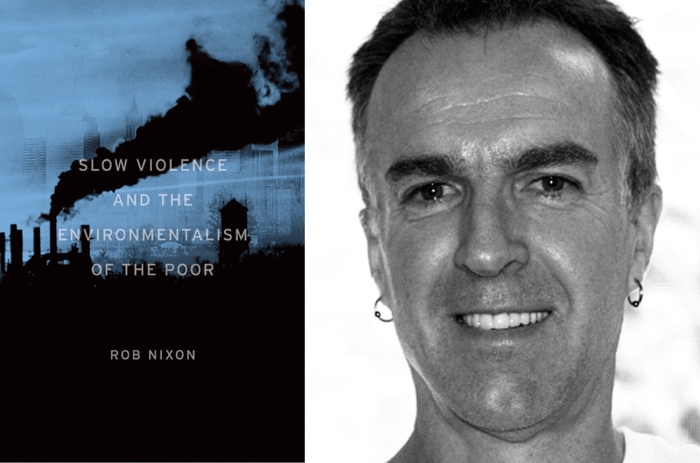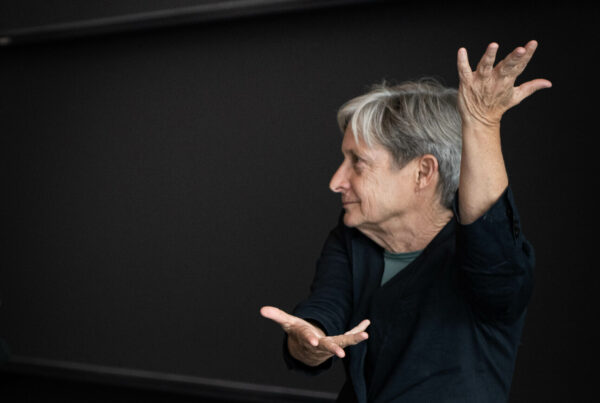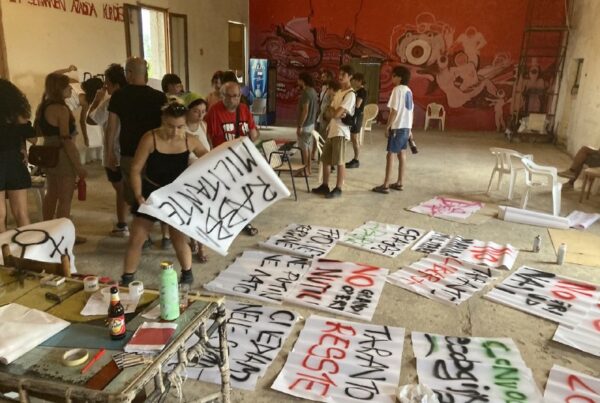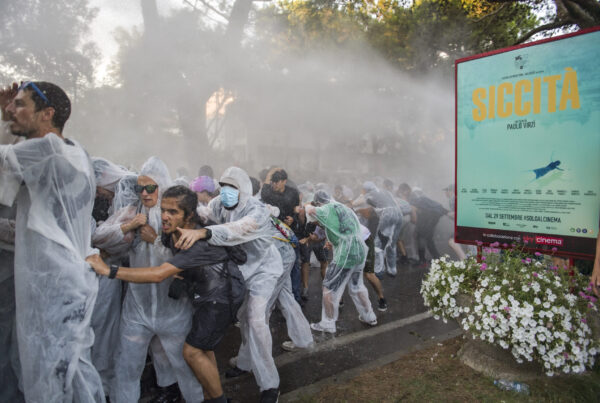by Salvatore De Rosa, Felipe Milanez and Gustavo García López
During the Tales from Planet Earth film festival that was held in Stockholm in April 2014, we had the possibility to share a coffee and a free-floating conversation with Professor Rob Nixon, author of the acclaimed book ‘Slow Violence and the Environmentalism of the Poor‘. Here is what we talked about.

Rob NIxon and the cover of his famous book, Slow Violence and the Environmentalism of the Poor, 2011. Photo credit: http://www.dailymaverick.co.za.
ENTITLE Fellows present at the festival previously reported on the movies and seminars HERE, HERE, HERE and HERE.
During those days of movies, seminars, talks and fantastic encounters, we had the possibility to share with Professor Rob Nixon a coffee and a free-floating conversation. Spanning from the intertwining of personal and political in his research trajectory, to the current role of Political Ecology in fostering emancipatory narratives of environmental change, talking with Rob left us wondering why we don’t have more of such committed scholars who are able to speak to broader audiences. And who can get right to the heart of things without being inaccessible.
***
Felipe: How did your background in South Africa shape your work?
Rob: I was in the Anti-Apartheid movement, and left the country as a political exile to avoid forced conscription. As a white kid coming out of school, you had to go to the army for two years. Therefore, after college, I left. My memories of life back then are of a constant state of emergency. In the late 1980s, the South African government introduced a law to ban the use of cameras, they said: “The camera is an insurrectionary instrument”. In other words, in their eyes the camera was a source of the uprising. Their logic was that black people were not oppressed; it was the camera out there to trigger their responses and protests. This is very familiar in the XXIst century. Today, you see all these efforts on the part of the State to control the imaginary by blacking out certain kinds of images and certain kind of stories. Particularly in US, this is tight to terrorism and even eco-terrorism.
Environmental Justice struggles are another important element of my background. I grew up with a fundamental aversion of colonial conservation schemes. You know, the old style conservation, the idea that conservation is about animals, and the history in South Africa, as in the US and elsewhere, of invisibly displaced people. People were displaced in order to create, to invent nature. I realized this when I got interested in hydroelectric dams. There was a dam called Kariba Dam in Zimbabwe, which was one of the biggest dams in Africa at the time. They flooded a valley to build it, and because Africa is very rich in wildlife, all the Giraffes were sinking in water. The monkeys hanging from trees were going down in the flood together with antelopes and lions. And suddenly you could see all these conservationists in kaki, wildlife conservationists, going out on boats to rescue them. It was called “Operation Noah”. This was shown in the schools and it was presented as an act of humanism, the feelings of these people for the animals, in the face of the hydroelectric dam.
What was never part of the story were all the people who were displaced, forcibly removed, taken in trucks to a faraway landscape, and basically condemned to suffer malnutrition. The official story was just about particular humans, the white settlers, and the animals. Later I realized there was this other story, this other community. And so this idea of developmental refugees started growing in me. The elites were saying, we are modern now, we have the mega dam, look at us, and we are humane, because we are taking care of the animals. The other story was that the displaced people were not just moved, but also forced to live in a different ecosystem. They were river people and then they were moved to the dry savanna. So there is clearly a problem there.
In the 19th century a British poet called John Clare was writing about enclosures. He was a sort of a peasant, and he wrote about people forced out of the land. One of the things he said was “I was moved out of my knowledge”, and that is exactly what these people suffer. It is not only a matter of resources, but the fact that people have developed a culture of adaptation that is ill-suited to different ecosystems. I think this is a big part of that story, often made invisible.
Felipe: What was your relation with your supervisor Edward Said? What did you learn from him?
Rob: I learned a lot from him. For example, talking about movies, about the short, multiple, versatile, movie vs. the long movie. He was encouraging the short quick intervention and he was aware of the value of the long, slow, footnoted version. They both have a place in the machinery of opposition, it is not like you have to choose one or the other.
In the 1980s was a time when a lot of people in the US were getting very inward looking theoretically. People were speaking to each other in very small circles, and I think what I liked about him was that he was talking outwards. He was very good to adjust his style to different audiences, to get a sense of what an audience can pick up on a radio, in print, or in TV. He was always on the phone talking in public language and then writing with his other hand a long mail. I could see the multiple personalities and the different speeds of his delivery.
The other side that was very important to me was to see the echoes between South Africa and Palestine: the displacement, the fragmentation of land into non-viable units. And the ways in which the battle for resources creates violence and desperation, that then is used as an accusation against people as lesser humans. Because they are desperate. And so the way that system replicates itself in different geographies – not that the two societies are identical but you see similar practices travelling from one place to the other.
Felipe: When you moved out from your country, how did you compare the new setting and link it to what was going on in Africa or elsewhere?
Rob: When you come with a political background, you are obsessed with that one struggle. That’s the heartbeat. Then you realize that there is not just that one struggle, but there are other people who face a similar set of obstacles and manipulations. And who have also experienced similar solidarities. You start reading the literature and you relate to other stories. I say, the story is incomplete if you do not compare. And comparison is an encouragement for people.
Salvatore: It is like one can find the same structural forces in waste conflicts, dam construction, deforestation, etc., and you come to a point that you realize it is a mindset you are struggling with.
Rob: Absolutely. Most of the times the connection is modernization: going “forward” at any costs with more technology. Even when it is actually a backward step in terms of public health or in terms of civil rights. I think the question is about memory, and the way in which neoliberalism has been around for a long time now. Many people do not remember a time before it. So part of the role of scholars is to remind people of alternatives in the past and in different places. And explain that there are ways in which the neoliberal mindset becomes so encrusted that people think that’s the way it is. Well that’s not the way it is, it is like this only because they have acclimatized us to an emergency and we let them take care of it. A lot of people then just back off from civil engagement. Because the laws are discouraging them from being active citizens.
The difference between civil and uncivil is flipped, because if laws are uncivil then who is the civilian? And I think this is where the commons is so important. Not just for the environmental movement but in terms of building a bridge between the environment and what it means to be a citizen. The idea of the public good, the State being on the side, as opposed to trying to erode that space, to erode participation, the distribution of access to the means of survival.
Salvatore: How do you see in this regard the role of Political Ecology as a discipline, in fostering this process of realization of bridges?
Rob: I think Political Ecology has been very productive because it has brought humans into the landscape, without removing the non-humans. And the hard thing is to keep them together in the picture. I grew up with a lot of cynicism in Africa towards environmentalism. People were calling it green racism, green imperialism, and they were right. Because that was the way it worked. Because it was people in Geneva, in London and Washington to decide, to put the face of an animal there and say this is what it means to be an environmentalist. And because Africa is full of animals, a lot of people are doing the environmentalists there in order to save the animals.
We had the misfortune of having a lot of megafauna, because local people felt there were barriers for which they were not consulted. As a result, there was a widespread perception that the values of locals in relation to the environment were not environmental enough, because they didn’t come from Geneva. But now, I think that across the world more and more people are saying that the environment is a very big thing, and they have a history – like in the case of the Inuit – in seeing climate as cultural, long before the scientists saw it as scientific. There are places where you cannot live without having a culture of climate, and that is an indigenous form of environmentalism that can be articulated too. I think Political Ecology has been very committed to promoting those kinds of discussions.
Gustavo: What will you say are some of the most influential thinkers that you draw from to build the idea of Slow Violence?
Rob: Rachel Carson was one. When she talks about “death by indirection”. I think probably Johan Galtung’s structural violence, and reading about poverty as structural violence. And then my effort in trying to think the difference with the XXIst century. First, I wanted the idea of change, of movement, of change at different speeds, so that you can contrast the speeds. The high speed events are the ones that get most of the attention. Also thanks to the digital revolution. For people like us who have access to digital culture, we know that our brains operate differently, under different pressure, we have different currencies for drama, spectacle, different expectations maybe.
I was also influenced by Ramachandra Guha, the Indian historian, not so much for the concept of Slow Violence, but for presenting an alternative genealogy of environmentalism. He was saying, if you look in Indian history there have been all these movements, we did not require America to invent and export environmentalism. In every place, there are histories where people recognize that subsistence security was under threat and that they had to do something about it or die.
With Slow Violence, what I wanted were words that were simple and powerful. Sometimes you get neologisms but every time you use them, you have to explain what it means. So I thought slow and violence are very simple words and it is quite easy to get what that means for somebody who does not have higher education. As opposed to extraterritoriality for example, or those other words. I am not saying that all these concepts we use need to be transparent, but I think that it helped to concentrate my thinking around something simple, that can be communicated both in an academic context and in an activist context.
Gustavo: You mentioned your experience at Columbia University, and then moving to Wisconsin. How do you see American academia, how did you experience it?
Rob: I have a paradoxical situation, I grew up white, so I had a privileged background. But I was also the first generation to go to college. So there is a contradiction there, and I think often energy comes through contradictions. There was nobody who had a college degree in my family and I end up getting a PhD from Columbia, it is a big gap. At the same time, if I was black it was one in a million chances that I would have ended up there. I recognize that tension.
With regard to academia, in the past universities were set up with the idea of being in service to the State. Even the people who did not go to college wanted to open the corridors to future children of the State to go to college, so there was a strong emphasis on upper mobility. Now, with the neoliberalization of education, the State instead of spending 75% is spending 12%. And the risk comes from endowments, federal research funds, putting a student fee, it is like in Chile and everywhere else, students are protesting the burden of debt. Because this idea of the public good in our education has been cut away, and so it is always about the private individuals. This is also about the commons. Is the university there for society? Or is it there for the individual career? This is the big tension in US universities and almost everywhere now.
One difference with other systems, especially in the Anglophone world, is the quantification, the metrics, so that you get peer reviewed essays and you have to collect points. I have a friend, an environmental historian from South Africa, who was giving a really interesting talk recently, and I told her, this is obviously a book, I am really looking forward to the book. And she said no, I cannot afford to write a book, because the standard disciplines set the agenda, and their method is that you get research points for peer reviewed essays, but not for a book. In the US it is still the opposite, a book is more important than five papers.
With this other system there is so much pressure on people to constantly produce peer reviewed essays. But if you look at some of the most interesting books, some people are silent for four, five years while thinking and writing privately, and often in relation to community struggles and so forth, and then they come out with something that has the benefit of slow thought. I think the mechanization and the metric-driven nature of higher education is again an attack on the idea of the public intellectual, of slow thought, of deliberation. I think that keeping alive those traditions, which are so under pressure, is a very important task for us. And that is when the lesson of Said comes back to me, a sense of a legacy of activism that existed continuously with his scholarship.
Felipe: What connects all the movements we are seeing today, environmental justice and others, are they revolutionaries or NIMBY?
Rob: I think there is a way in which some of these movements connect, now that it is easier to make connections. I talk a lot about the role of imageries and stories in helping people recognize each other across borders. It is good to remember that there are so many capitalisms, and even if we are not talking about overthrowing the State, if we are talking about alternative ideas of citizenship, of distribution of resources, there are so many models.
People are saying that this great divergence is unsustainable. If you look at Mike Davis’ Planet of Slums, or at a novel like Animal’s People by Indra Sinha about the Bhopal disaster, they both end with the “people of the apocalypse” saying: “You can build higher and higher walls, but if you throw more and more people on the other side of the wall, eventually they will push the wall down.” I think you can now find these zones of exclusion getting bigger and bigger.
There is a very interesting example in Lagos, a city of 21 million people with huge slums. On the one hand there is a guy who is trying to build solar panels in the favela. And on the other hand you get a new development that is a planned island, away from the city, called Eko Atlantic. It is going to be a green city for millionaires flying in from London, that is separate, literally offshore, but is advertised as eco-friendly. People will come and go by helicopter. The favela is not green but the manufactured island is. It is almost like a fantasy, some mythological being, and the architect and designers are talking green all the time. But it is a complete segregation of the ultra-rich from the ultra-poor, so that they do not share any common infrastructure.
Gustavo: They are doing the same in China I think, and in Abu Dhabi, I think also Brasilia was planned like that, as a sort of perfect city.
Rob: But you can see how that breaks down. In places like Los Angeles, where housing is really expensive in the center, people like nurses, teachers, workers cannot afford to live there, and the commute is getting bigger and bigger. So they decide to go and live somewhere else. And so the city itself becomes a denial of its dependence on certain groups of people, whom it prefers not to think about. In essence this is not sustainable. Another thing that has shocked a lot of people is that in some cities they are now trying to privatize the firefighters. So you will need to pay $200 a year to sign up. If you are experiencing a fire they will check if you are registered, and if not they will let you burn. Even to some neoliberals this is kind of shocking.
Felipe: A last, difficult question. What is capitalism today?
Rob: I see that accumulation and growth became ends in themselves, and the idea of the unregulated market became an ethic. It is naturalized. People are led to either accepting it or being resigned to higher levels of disparity. Of course not everybody is, for example, there were 55.000 environmental protests in China in 2012. People realized they can be wealthier but if they cannot breathe, that wealth is not worth very much. So there are all these flashpoints which force people to reconsider their values. Even people who might be conservative in other ways will generally be in favor of breathable air.






3 Comments